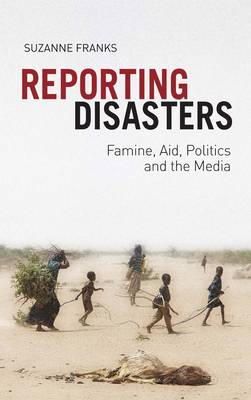'Expertly illustrating the relationship between media, NGOs, public opinion and the developing world, the book is an essential reading for students of journalism, development, media and communications. The accessible writing style and captivating narrative make it a great read for everyone interested in media reporting of the developing world and global humanitarianism, issues that are as timely now as they...
Read more'Expertly illustrating the relationship between media, NGOs, public opinion and the developing world, the book is an essential reading for students of journalism, development, media and communications. The accessible writing style and captivating narrative make it a great read for everyone interested in media reporting of the developing world and global humanitarianism, issues that are as timely now as they were in 1984.'
Media, Culture & Society
'Franks delves beyond the face of the images found in Michael Buerk's report to address the integral role played by the realm of communications, emphasising how the degree to which a news story permeates society depends on the medium used, and the even more profound topic of the evolution of media.'
Think Africa Press
'Incorporating internal government and BBC documents with a wealth of interviews with key players, Franks highlights the changing relationship between aid charities and the media, the internal wrangles between broadcasters, and the effect of famine reporting on government policy. The result is a meticulously researched and grippingly written corrective to a widely accepted fallacy.'
Times Higher Education
'Reporting Disasters makes a powerful case for a better understanding of the causes of hunger. Franks shows how the way starving people in Ethiopia were portrayed on TV - the famous 'Biblical famine' of 1984 - distorted the world's response, inspiring aid deliveries that may have done more harm than good. The coverage failed to understand the politics of famine. This is the best kind of history - one that challenges stereotypes and asks uncomfortable questions.'
David Loyn, BBC International Development Correspondent
'The cause and effect relationship between media and policy making in crises continues to be dominated by often ill-informed assumptions more than examination of hard facts from all angles. Suzanne Franks' interviews and access to historical records reveal compelling evidence that often challenges orthodox assumptions that images and powerful TV reporting in particular drive the most appropriate, pro-active policy response. Her important analysis is not unique to humanitarian disasters.'
Nik Gowing, international broadcaster and journalist
'This is the compelling life story of a transformational news event. Famine footage from Ethiopia allied to the pop star glamour of Live Aid confirmed the predominance of television news and changed the aid business for ever. Thirty years on, with fresh revelations from inside Government and the BBC, Suzanne Franks' study takes on contemporary significance as TV news and overseas aid confront potentially disabling new challenges.'
Peter Gill, journalist and author of Famine and Foreigners: Ethiopia Since Live Aid
'This fascinating book is a must-read for anyone with an interest in the enduring effects on the aid industry of the nexus of global politics, celebrity and the media of the mid-1980s. Franks' sweeping narrative offers an unprecedented, detailed insight into events which were to define a generation's view of Africa in the wake of Michael Buerk's iconic 1984 television news report about the Ethiopian famine.'
Leigh Daynes, Executive Director of Medecins du Monde in the UK
'As we approach the thirtieth anniversary of the 1984 famine and the iconic BBC TV film by Michael Buerk and Mohammed Amin, Suzanne Franks provides us with a comprehensive and detailed analysis of how that film came to be made and its profound impacts on the various actors in the humanitarian drama - donors, humanitarian agencies, celebrities and fundraisers, and on the media itself. Using this watershed moment in the media coverage of disasters, she explores the relationship between the media and humanitarian actors, exposing the overlapping and sometimes conflicting interests of journalists and humanitarian agencies and the ways in which they are reconciled - often presenting the public with oversimplifications and occasionally significant misrepresentations. This impressive book is a significant addition to the literature and deserves to become a standard reference in training courses for both journalists and humanitarian workers.'
John Borton, Senior Research Associate, Humanitarian Policy Group, Overseas Development Institute
'A fascinating, thoroughly researched and eminently readable book which makes a major contribution to our understanding of television's impact on politics, policy-makers and audiences. Highly recommended for anyone interested in the relationship between media and politics.'
Steven Barnett, Professor of Communications, University of Westminster
'A hard-headed analysis of the famous reporting [of the 1984-5 Ethiopian Famine] by Michael Buerk, and its consequences. - Franks is able to explain why this well-crafted report made such waves, when previous TV documentary and radio reports on famine in Ethiopia broadcast as much as a year earlier did not. For students of journalism and for all those who want to understand how Africa has struggled for years to be reported properly and with the subtlety and depth we expect of Western culture, Reporting Disasters will be a rich and worthwhile read.'
Fiona Chesterton, LSE Review of Books.
'The book is analytically rigorous and does not pull its punches, taking the reader through the development of the famine and its reporting. ... This is an important book, not just for the study of the Ethiopian famine, the role of NGOs and media coverage of humanitarianism, but for the study of the framing of Africa in the media and popular opinion. It should be on reading lists for courses on foreign reporting, African studies and communications.'
Keith Somerville, Senior Research Fellow at the Institute of Commonwealth Studies, University of London and Lecturer in the School of Politics and International Relations and the Centre for Journalism at the University of Kent
Read less
